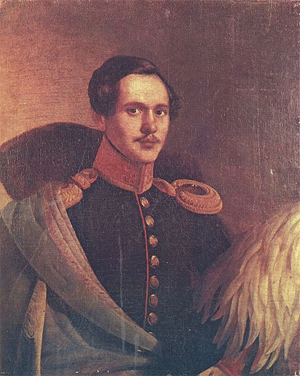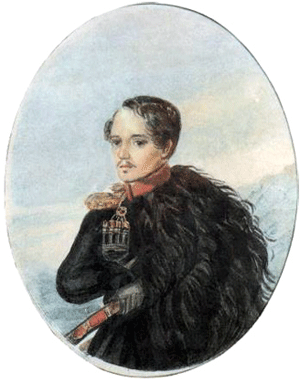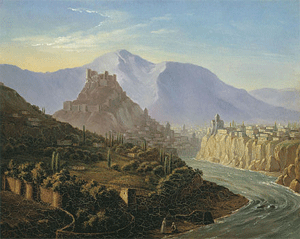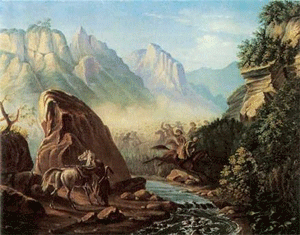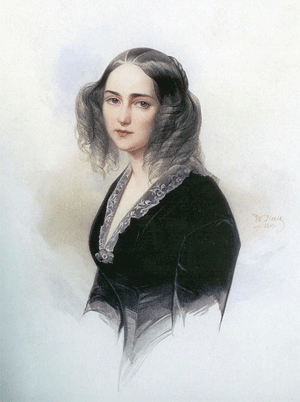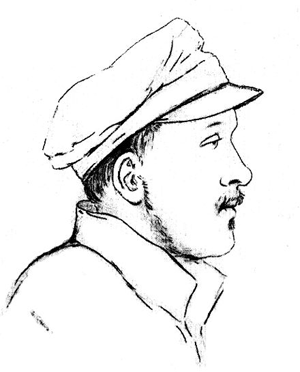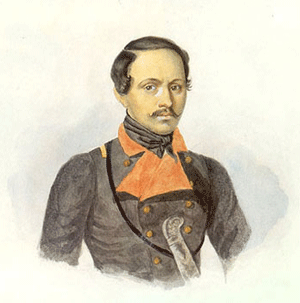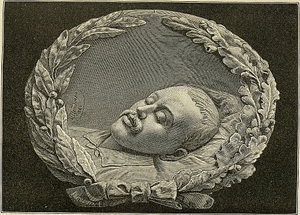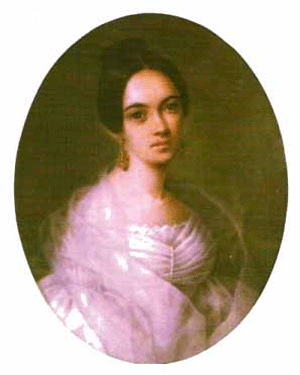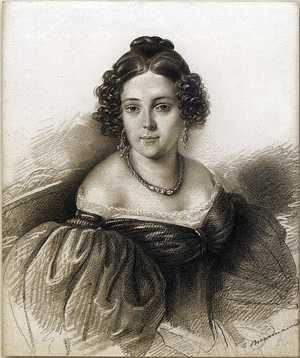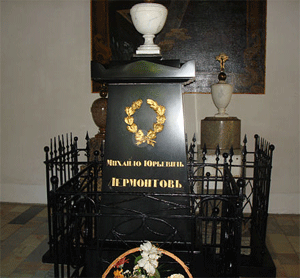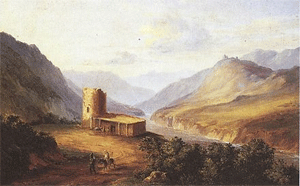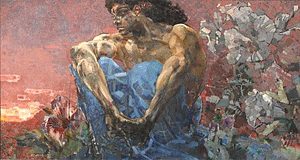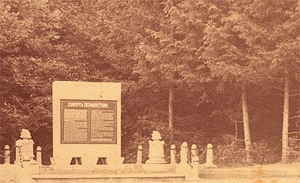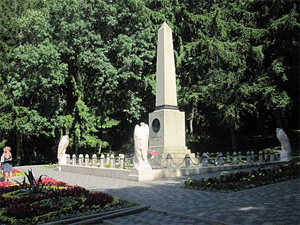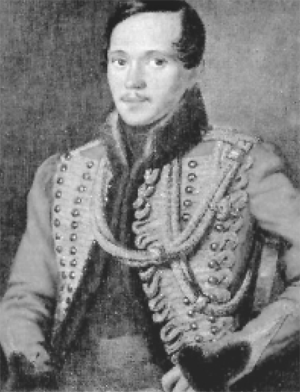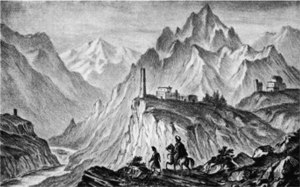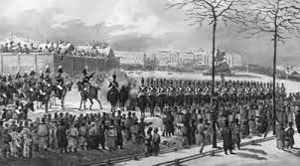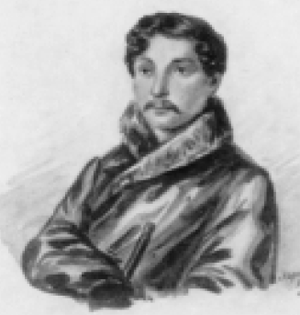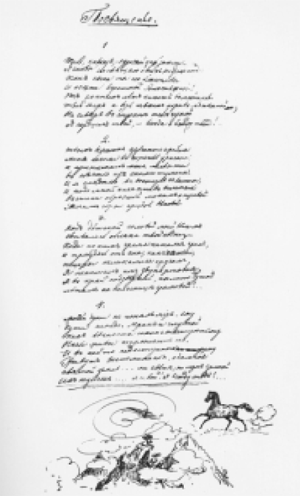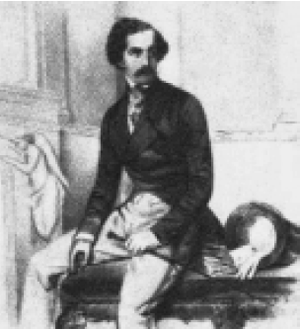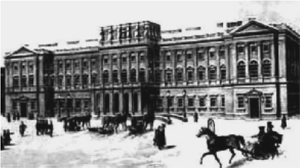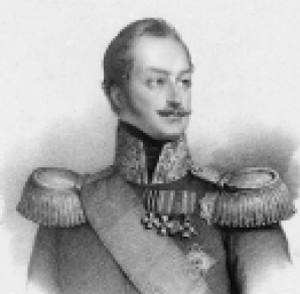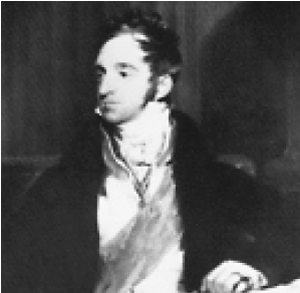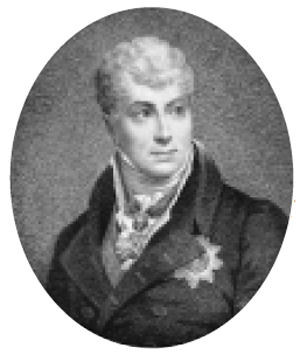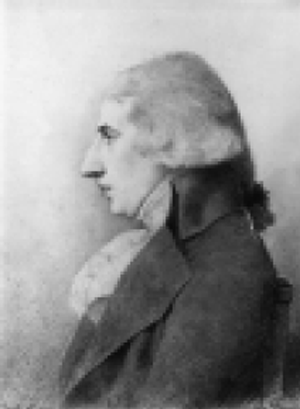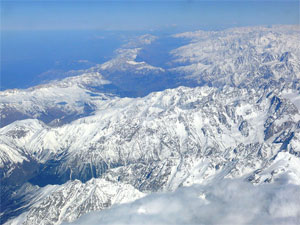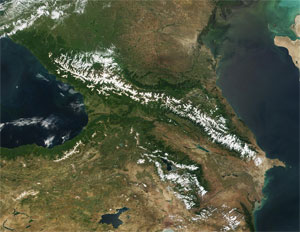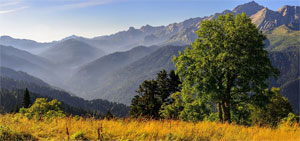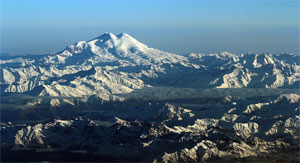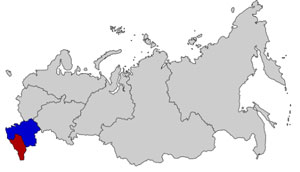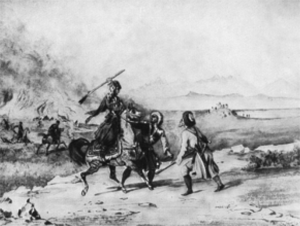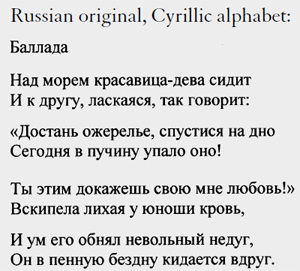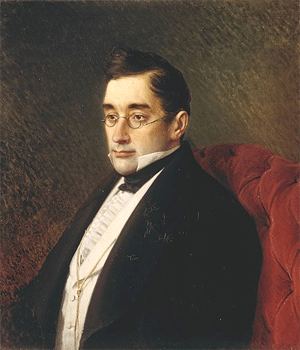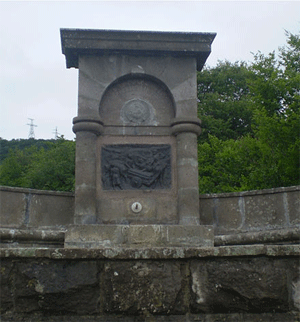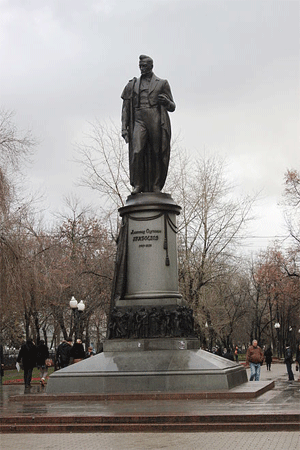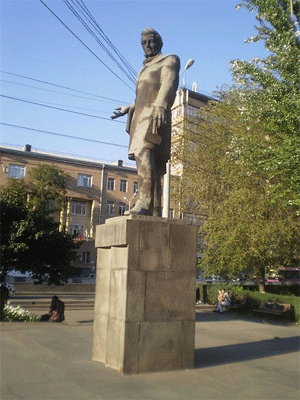Mikhail Lermontov
by Wikipedia
Accessed: 8/16/18
NOTICE: THIS WORK MAY BE PROTECTED BY COPYRIGHT
YOU ARE REQUIRED TO READ THE COPYRIGHT NOTICE AT THIS LINK BEFORE YOU READ THE FOLLOWING WORK, THAT IS AVAILABLE SOLELY FOR PRIVATE STUDY, SCHOLARSHIP OR RESEARCH PURSUANT TO 17 U.S.C. SECTION 107 AND 108. IN THE EVENT THAT THE LIBRARY DETERMINES THAT UNLAWFUL COPYING OF THIS WORK HAS OCCURRED, THE LIBRARY HAS THE RIGHT TO BLOCK THE I.P. ADDRESS AT WHICH THE UNLAWFUL COPYING APPEARED TO HAVE OCCURRED. THANK YOU FOR RESPECTING THE RIGHTS OF COPYRIGHT OWNERS.
Will you, poet, who is mocked, reawake!
Or, will you never avenge against those who spurn—
From the golden scabbard unsheathe your blade,
Covered with the rust of scorn?
-- from ‘The Poet,’ 1838
E’er since the judge eterne
The prophet’s omniscience gave me,
In people’s eyes do I discern
The pages of malice and enmity.
To proclaim love I came
And the pure truths of learning:
All my neighbors, enraged,
At me stones were hurling
With embers I strewed my head,
From the cities did I flee
And thus I live in the desert;
Like the birds, on food divine and free.
-- The Prophet, 1841
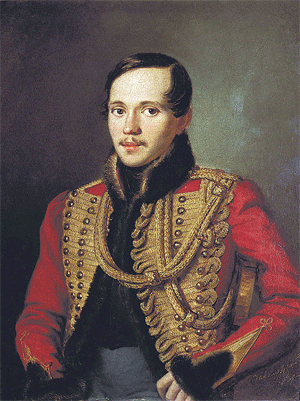
Mikhail Lermontov
Mikhail Lermontov in 1837
Born Mikhail Yuryevich Lermontov
October 15 [O.S. October 3] 1814
Moscow, Russian Empire
Died July 27 [O.S. July 15] 1841 (aged 26)
Pyatigorsk, Caucasus Oblast, Russian Empire
Occupation Poet, novelist, artist
Nationality Russian
Period Golden Age of Russian Poetry
Genre Novel, poem, drama
Literary movement Romanticism, pre-realism
Signature
Mikhail Yuryevich Lermontov (/ˈlɛərmənˌtɔːf, -ˌtɒf/;[1] Russian: Михаи́л Ю́рьевич Ле́рмонтов, IPA: [mʲɪxɐˈil ˈjurʲjɪvʲɪtɕ ˈlʲɛrməntəf]; October 15 [O.S. October 3] 1814 – July 27 [O.S. July 15] 1841) was a Russian Romantic writer, poet and painter, sometimes called "the poet of the Caucasus", the most important Russian poet after Alexander Pushkin's death in 1837 and the greatest figure in Russian Romanticism. His influence on later Russian literature is still felt in modern times, not only through his poetry, but also through his prose, which founded the tradition of the Russian psychological novel.
Biography
Mikhail Yuryevich Lermontov was born in Moscow into the respectable noble family of Lermontov, and he grew up in the village of Tarkhany (now Lermontovo in Penza Oblast).[2] His paternal family descended from the Scottish family of Learmonth, and can be traced to Yuri (George) Learmonth, a Scottish officer in the Polish-Lithuanian service who settled in Russia in the middle of the 17th century.[3][4][5] He had been captured by the Russian troops in Poland in the early 17th century, during the reign (1613–1645) of Mikhail Fyodorovich Romanov.[2] Family legend asserted that George Learmonth descended from the famed 13th-century Scottish poet Thomas the Rhymer (also known as Thomas Learmonth).[2] Lermontov's father, Yuri Petrovich Lermontov, like his father before him, followed a military career. Having moved up the ranks to captain, he married the sixteen-year-old Maria Mikhaylovna Arsenyeva, a wealthy young heiress of a prominent aristocratic Stolypin family. Lermontov's maternal grandmother, Elizaveta Arsenyeva (née Stolypina), regarded their marriage as a mismatch and deeply disliked her son-in-law.[6] On October 15, 1814, in Moscow where the family temporarily moved to, Maria gave birth to her son Mikhail.[7]
Early life
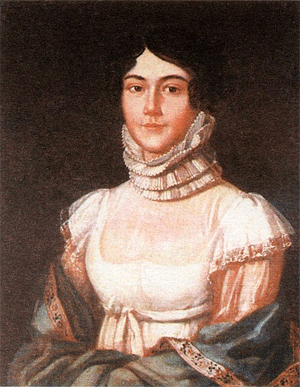
Maria Mikhaylovna Lermontova (1795–1817), the mother of the poet
The marriage proved ill-suited and the couple soon grew apart. "There is no strong evidence as to what had precipitated the quarrels they've had. There are reasons to believe Yuri has got tired of his wife's nervousness and frail health, and his mother-in-law's despotic ways," according to literary historian and Lermontov scholar Alexander Skabichevsky. An earlier biographer, Pavel Viskovatov, suggested the discord might have been caused by Yuri's affair with a young woman named Yulia, a lodger who worked in the house.[8][9] Apparently it was her husband's violent, erratic behavior and the resulting stresses that accounted for Maria Mikhaylovna's early demise. Her health quickly deteriorated, she developed tuberculosis and died on 27 February 1817, aged only 21.[7][2]
Nine days after Maria's death a final row broke out in Tarkhany and Yuri rushed away to his Kropotovo estate in Tula Governorate where his five sisters resided. Yelizaveta Arsenyeva launched a formidable battle for her beloved grandson, promising to disinherit him if his father took the boy away. Eventually the two sides agreed that the boy should stay with his grandmother until the age of 16. Father and son separated and, at the age of three, Lermontov began a spoilt and luxurious life with his doting grandmother and numerous relatives. This bitter family feud formed a plot of Lermontov's early drama Menschen und Leidenschaften (1830), its protagonist Yuri bearing strong resemblance to the young Mikhail.[4][6][10]
The Poet
by Mikhail Lermontov (1830, age 16)
translated by Denise M. Henderson
And when Raphael, so inspired,
The pure Virgin’s image, blessed,
Completed with his brush afire,
By his art enraptured
He before his painting fell!
But soon was this wonderment
In his youthful breast tamed
And, wearied and mute,
He forgot the celestial flame.
Thus the poet: a thought flashing,
As he, heart and soul, his pen dashing,
With the sound of his famed lyre
Charms the world; in quiet deep
It sings, forgetting in heavenly sleep
Thou, thou! The idol of his soul!
Suddenly, his fiery cheeks grow cold,
All his tend’rest passions
Are quiet, and flees the apparition!
But how long, how long the mind holds
The very first impression.
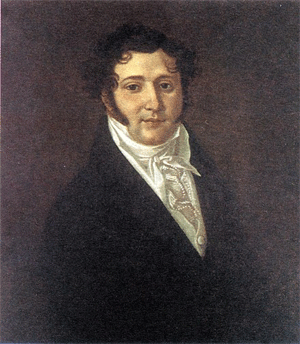
Yuri Petrovich Lermontov (1787–1831), the poet's father
In June 1817 Yelizaveta Alekseyevna moved her grandson to Penza. In 1821 they returned to Tarkhany and spent the next six years there.[7] The doting grandmother spared no expense to provide the young Lermontov with the best schooling and lifestyle that money could buy. He received an extensive home education, became fluent in French and German, learned to play several musical instruments and proved a gifted painter.[5][9] While living with the grandmother, Mikhail hardly met with his father.
But the boy's health was fragile, he suffered from scrofula and rickets (the latter accounted for his bow-leggedness) and was kept under close surveillance of a French doctor, Anselm Levis. Colonel Capet, a Napoleon army prisoner-of-war who settled in Russia after 1812, was the boy's first, and best-loved governor.[11] A German pedagogue, Levy, who succeeded Capet, introduced Mikhail to Goethe and Schiller. He didn't stay for long and soon another Frenchman, Gendrot, replaced him, soon joined by Mr. Windson, a respectable English teacher recommended by the Uvarov family. Later Alexander Zinoviev, a teacher of Russian literature, arrived. The intellectual atmosphere in which Lermontov grew up resembled that experienced by Aleksandr Pushkin, though the domination of French had begun to give way to a preference for English, and Lamartine shared popularity with Byron.[5][9][12]
Looking for a better climate and treatment at the mineral springs for the boy, Arsenyeva twice, in 1819 and 1820, took him to the Caucasus where they stayed at her sister E.A. Khasatova's. In summer 1825, as the nine-year-old's health started to deteriorate, the extensive family traveled south for the third time.[7] The Caucasus greatly impressed the boy, inspiring a passion for its mountains and stirring beauty. "Caucasian mountains for me are sacred", he wrote later. It was there that Lermontov experienced his first romantic passion, falling for a nine-year-old girl.[5][13]
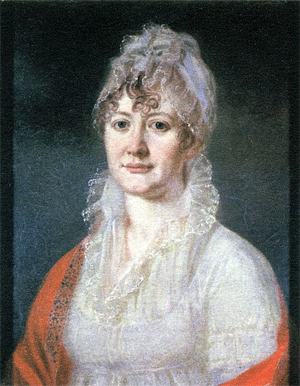
Yelizaveta Arsenyeva, Lermontov's grandmother
Fearing that Lermontov's father would eventually claim his right to bring up his son, Arsenyeva strictly limited contact between the two, causing young Lermontov much pain and remorse. Despite all the pampering lavished upon him, and torn by the family feud, he grew up lonely and withdrawn. In another early autobiographical piece, "Povest" (The Tale), Lermontov described himself (under the guise of Sasha Arbenin) as an impressionable boy, passionately in love with all things heroic, but otherwise emotionally cold and occasionally sadistic. Having developed a fearful and arrogant temper, he took it out on his grandmother's garden as well as on insects and small animals ("with great delight he would squash a hapless fly and bristled with joy when a stone he'd thrown would kick a chicken off its feet").[14] Positive influence came from Lermontov's German governess Christina Rhemer, a religious woman who introduced the boy to the idea of every man, even if that man was a serf, deserving respect. In fact, Lermontov's poor health served in a way as a saving grace, Skabichevsky argued, for it prevented the boy from further exploring the darker sides of his character and, more importantly, "taught him to think of things... seek pleasures that he couldn't find in the outer world, deep inside himself."[15]
Returning from his third trip to the Caucasus in August 1825, Lermontov begun his regular studies with tutors in French and Greek, starting to read German, French and English authors' original texts.[5] In summer 1827 the 12-year-old for the first time travelled to his father's estate in Tula Governorate. In autumn of that year he and Yelizaveta Arsenyeva moved to Moscow.[4][16]
School years
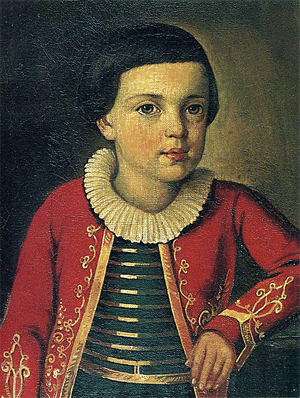
Lermontov as a child
After having received a year of private tutoring, in February 1829 the thirteen-year old Lermontov took exams and joined the 5th form of the Moscow University's boarding-school for the nobility's children.[17] Here his personal tutor was poet Alexey Merzlyakov, alongside Zinoviev, who taught Russian and Latin.[7] Under their influence the boy started to read a lot, making the best of his vast home library, which included books by Mikhail Lomonosov, Gavrila Derzhavin, Ivan Dmitriev, Vladislav Ozerov, Konstantin Batyushkov, Ivan Krylov, Ivan Kozlov, Vasily Zhukovsky, and Alexander Pushkin.[15] Soon he started editing an amateur student journal. One of his friends, his cousin Yekaterina Sushkova (Khvostova, in marriage) described the young man as "married to a hefty volume of Byron". Yekaterina had at one time been the object of Lermontov's affections and to her he dedicated some of his late 1820s poems, including "Nishchy" (The Beggar).[18] By 1829 Lermontov had written several of his well-known early poems. While "Kavkazsky Plennik" (Caucasian Prisoner), betraying strong Pushkin influence and borrowing from the latter, "The Corsair", "Prestupnik" (The Culprit), "Oleg", "Dva Brata" (Two Brothers), as well as the original version of "The Demon" were impressive exercises in Romanticism. Lord Byron remained the major source of inspiration for Lermontov, despite the attempts of his literary tutors, including Semyon Rayich, the head of the school's literature class, to divert him from that particular influence. The short poem "Vesna" (The Spring), published in 1830 by the amateur Ateneum magazine, marked his informal publishing debut.[5][16][16]
Along with his poetic skills, Lermontov developed an inclination towards poisonous wit and cruel, sardonic humor. His ability to draw caricatures was matched only by his ability to pin someone down with a well aimed epigram. In the boarding school Lermontov proved an exceptional student. He excelled at the 1828 examinations; he recited a Zhukovsky poem, performed a violin étude and won the first prize for his literary essay.[5] In April 1830 the University's boarding school was transformed into an ordinary gymnasium and Lermontov, like many of his fellow-students, promptly quit.[7][15]
Moscow University
In August 1830 Lermontov enrolled in Moscow University's philological faculty.[7] "Petty arrogance" (as Skabichevsky puts it) prevented him from joining any of the three radical students' circles (those led respectively by Vissarion Belinsky, Nikolai Stankevich and Alexander Hertzen). Instead he drifted towards an aristocracic clique, but even this cream of the Moscow's "golden youth" detested the young man for being too aloof, while still giving him credit for having charisma. "Everyone could see that Lermontov was obnoxious, rough and daring, and yet there was something alluring in his firm moroseness," fellow-student Wistengof admitted.[19]
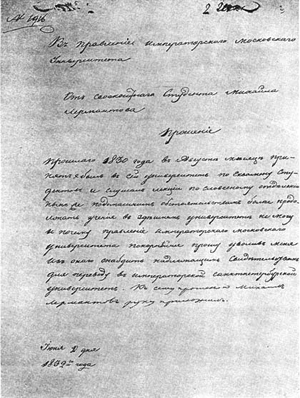
Lermontov's handwritten request to Moscow University for leave
Attending lectures faithfully, Lermontov would often read a book in the corner of the auditorium, and never took part in student life, making exceptions only for incidents involving grand-scale trouble-making. He took an active part in the notorious 1831 Malov scandal (when a jeering mob drove the unpopular professor out of the auditorium), but wasn't formally reprimanded (unlike Hertzen, who found himself incarcerated).[5][7] A year into his university studies, the final, tragic act of the family discord played itself out. Deeply affected by his son's alienation, Yuri Lermontov left Arsenieva's house for good, only to die a short time later of consumption.[20] His father's death under such circumstances was a terrible loss for Mikhail and is reflected in his poems "Forgive Me, Will We Meet Again?" and "The Terrible Fate of Father and Son". For some time he seriously considered suicide; tellingly, each of his early dramas Menschen und Leidenschaften (1830) and A Strange Man (1831) ends with a protagonist killing himself.[21] All the while, judging by his diaries, Lermontov, maintained a keen interest in European politics. Some of his University poems like "Predskazaniye" (The Prophecy) were highly politicised; the unfinished "Povest Bez Nazvaniya" (The Untitled Novel)'s theme was the outbreak of popular uprising in Russia. Several other verses written at the time – "Parus" (The Sail), "Angel Smerti" (Angel of Death) and "Ismail-Bei" – later came to be regarded among his best.[5]
The Prophecy
by Mikhail Lermontov
translated by Yevgeny Bonver
A year will come, the year of Russia, last,
When the monarchs' crown will be cast;
Mob will forget its former love and faith,
And food of many will be blood and death;
When the cast off law will not guard
A guiltless woman and a feeble child;
When the plague on bodies, sick or dead,
Among the gloomy villages will spread,
To call from huts with pieces of a rag,
And dearth will maim this poor earth as plague;
And on the lakes will fateful glow lay:
A mighty man will come in this black day.
You'll recognize this man and understand,
Why he will have the shining knife in hand:
And woe for you! -- Your moans and appeals
He will consider just as funny things;
And all his image will be awful now,
As his black mantle and his lofty brow.
The Sail
by Mikhail Lermontov (1832, 18 years old)
by Denise M. Henderson
Gleams white a solitary sail
In the haze of the light blue sea.—
What seeks it in countries far away?
What in its native land did leave?
The mast creaks and presses,
The wind whistles, the waves are playing;
Alas! It does not seek happiness,
Nor from happiness is fleeing!
Beneath, the azure current flows,
Above, the golden sunlight streaks:—
But restless, into the storm it goes,
As if in storms there is peace!The Angel
by Mikhail Lermontov (1834)
translated by Denise M. Henderson
An angel flew in the midnight sky,
And sang a lullaby;
And all around, the stars and the moon,
Heeded that holy song.
He sang of the blessedness of the innocent,
’Neath Eden’s tents,
About the great God he sang,
And his praise was unfeigned.
A young soul he held in his hands,
For the world of tears and sadness,
And the sound of his song in the young soul
Remained—without words, but whole.
And for a long time on earth that soul stayed,
But never could he trade
Heaven’s music, soaring,
For the songs of earth so boring.
In Lermontov's first year as a student no exams were held: the University closed for several months due to the outbreak of cholera in Moscow. In his second year Lermontov started to have serious altercations with several of his professors. Thinking little of his chances of passing the exams, he opted to leave, and on June 18, 1832, received the two-year-graduate certificate.[5][7]
1832–1837
In mid-1832 Lermontov, accompanied by grandmother, traveled to Saint Petersburg, with a view of joining the Saint Petersburg University's second-year course. This proved impossible and, unwilling to repeat the first year, he enrolled into the prestigious School of Cavalry Junkers and Ensign of the Guard, under pressure from his male relatives but much to Arsenyeva's distress. Having passed the exams, on November 14, 1832, Lermontov joined the Life-Guard Hussar regiment as a junior officer.[20][22] One of his fellow cadet-school students, Nikolai Martynov, the one whose fatal shot would kill the poet several years later, in his biographical "Notes" decades later described him as "the young man who was so far ahead of everybody else, as to be beyond comparison," a "real grown-up who'd read and thought and understood a lot about the human nature."[16]
Lermontov in 1834. Portrait by Pyotr Zakharov-Chechenets
The sort of glittering army career which tempted young noblemen of the time proved a challenge for Lermontov. Books there were a rarity and reading was frowned upon. Lermontov had to indulge mostly in physical competitions, one of which resulted in a horse-riding accident which left him with a broken knee that produced a limp.[20] Learning to enjoy the heady mix of drills and discipline, wenching and drinking sprees, Lermontov continued to sharpen the poisonous wit and cruel humour which would often earn him enemies.[9][22] "The time of my dreams has passed; the time for believing is long gone; now I want material pleasures, happiness that I can touch, happiness that can be bought with gold, that one can carry it in one's pocket as a snuff-box; happiness that beguiles only my senses while leaving my soul in peace and quiet," he wrote in a letter to Maria Lopukhina dated August 4, 1833.[20]
Concealing his literary aspirations from friends (relatives Alexey Stolypin and Nikolai Yuriev among them), Lermontov became an expert in producing scabrous verses (like "Holiday in Peterhof" "Ulansha", and "The Hospital") which were published in a school's amateur magazine Shkolnaya Zarya (School-Years' Dawn) under monikers "Count Diarbekir" and "Stepanov". These pieces earned him much notoriety and, with a hindsight, caused harm, for when in July 1835 for the first time ever his poem "Khadji-Abrek" was published (in Biblioteka Dlya Chteniya, without its author's consent: Nikolai Yuriev took the copy to Osip Senkovsky and he furthered it to print), many refused to take the young author seriously.[5][22]
Upon his graduation in November 1834, Lermontov joined the Life-Guard Hussar regiment stationed near St. Petersburg in Tsarskoye Selo, where his flatmate was his friend Svyatoslav Rayevsky. Grandmother's lavish financial support (he had his personal chefs and coachmen) enabled Lermontov to plunge into a heady high-society mix of drawing-room gossip and ballroom glitter.[9] "Sardonic, caustic and smart, brilliantly intelligent, rich and independent, he became the soul of the high society and the leading spirit in pleasure trips and sprees," Yevdokiya Rostopchina remembered.[23] "Extraordinary, how much youthful energy and precious time had Lermontov managed to spare upon wanton orgies and base love-making, without seriously damaging his physical and moral strength", biographer Skabichevsky marvelled.[23]
By now Lermontov had learnt to lead a double life. Still keeping his passions secret, he took a keen interest in Russian history and medieval epics, which would be reflected in The Song of the Merchant Kalashnikov ...The Lay of Tsar Ivan Vassilyevich, His Young Oprichnik and the Stouthearted Merchant Kalashnikov
by Mikail Lermontov
Hail to thee, all hail, Tsar Ivan Vassilyevich!
Tis of thee our lay we did make, O Tsar!
Aye, of thee, and thy well-liked oprichnik,
And the stouthearted merchant Kalashnikov.
In the ancient manner we made the lay,
To the strains of the psaltery sing it we did,
We intoned it loud and we chanted it,
And all good Christian folk took delight in it.
As for boyar Matvei Romodanovsky,
He to each gave a goblet of foaming mead,
And his lady fair did to us present,
On a silver tray laid out prettily,
A right handsome towel sewn with silken thread.
For three days and three nights in the feast we joined
Sing we did 'thout end, but they clamoured for more
I
Nay, 'tis not the sun shining bright in the sky,
With the clouds at its beauty marvelling;
Tis the Tsar at his board seated, proud of mien,
Tsar Ivan Vassilyevich in his crown of gold.
And behind him there stand his serving men,
And before him the boyars and princes sit,
His oprichniks they sit to each side of him.
To the glory of God does the good Tsar feast,
Merry makes the Tsar to his heart's content.
With a smile does he now bid his serving men
Fill his own gold cup full of rich, sweet wine,
Full of rich, sweet wine from beyond the seas,
And to pass it round to his henchmen bold -
The oprichniks drink and the Tsar they praise.
One amongst them all, he, a fine, brave youth,
But a wilful one, of unruly heart,
In the golden cup did not wet his lips;
Dark of face he sat, with his head bowed low
And his eyes cast down to the very ground,
Plunged in gloom sat he and in trying thought.
And the mighty Tsar sorely vexed was he,
Knit his brows he did, and with piercing gaze,
Like the hawk that, grim, from the heights above
Eyes the grey-blue dove, so the youth he eyed.
But the youth sat on, with his head bowed low....
In his wrath the Tsar brought his thick staff down;
With a deafening crash did its iron point
Full it sink and deep in the oaken floor -
Still the youth sat on, not a start gave he.
Then in thunderous tones did the Tsar speak up -
And the youth was roused from his revery.
"Hark and list, Kiribeyevich, brave my lad,
Is it treacherous thought thou dost harbour, say?
Dost thou envy the Tsar his glory and fame?
Of thy faithful service art weary grown?...
When the moon appears, the bright stars rejoice
That the paths of heaven wax luminous.
But should one amongst them hide its face,
To the shadowed earth it will, flashing, fall....
'Tis not meet for thee, Kiribeyevich,
Thus to scorn thy Tsar and his revelry;
Art thou not a Skuratov man by birth,
In Malyuta's own house and home brought up?..."
To his Tsar the oprichnik answer made,
'Fore him low, to the very ground, he bowed:
"Hear me out, my Tsar, hear me out, I pray!
Be not wroth with me, thy unworthy slave!
Wine won't quench the flames of a burning heart,
Gloomy thoughts and dark it will not drive off.
If I vex thee, sire, let thy will be done,
Bid them seize thy slave and his head chop off -
Heavy weighs it, Tsar, on my shoulders broad,
Of itself it bows to the grass-grown earth..."
Said to him the Tsar, with a laugh said he:
"What is there that grieves one so brave and young?
Is thy silken coat frayed and worn with age?
Is thy sable cap, once so fine, now torn?
Is thy purse, once full, free of jingling coin?
Has thy sword, once sharp, tarnished grown and blunt?
Has thy steed gone lame? Was he poorly shod?
Did a merchant's son knock thee off thy feet
In a fist fight fought on the river bank?"
Kiribeyevich of the curly locks
Proudly tossed his head as reply he made:
"Not a merchant's son, nor a boyar's son,
Nay, no man is there that can knock me down;
Fast my good steed runs, never falters he;
Bright as polished glass gleams my sabre sharp;
By thy favour, sire, on a festive day
Boast I do of dress rich as any man's;
When my steed I mount and go riding him
By the Moskva Stream and beyond as well,
With my silken sash round my waist wound tight
And my velvet cap trimmed with sable fur
On my curly head sitting rakishly,
At their gates appear fair young maids and wives,
By their gates they stand and they gaze at me,
And in whispers soft to each other speak.
Only one of them turns away from me,
With a striped silk veil her dear face she clothes...
"Search the whole of Russ, this our holy land,
And you'll never find one as fair, O Tsar:
Moves she gracefully as a white-winged swan,
Gentle is her gaze as a sweet young dove's,
Tender is her voice as a nightingale's,
Pink as dawn's first ray in the heavens high,
Bloom the roses two on her fresh young cheeks;
Twined with ribbons gay is her golden hair,
Tightly bound is it into silken plaits.
Down her shoulders, sire, run they playfully
And her bosom white touch caressingly.
Born was she in a merchant's house and home
And is named Alyona Dmitrevna.
"When I look at her I am not myself:
Strengthless grow my arms, limp they grow and weak,
And my eyes so keen, turn they dark and dim;
Sorrow fills my heart at the fearful thought
That the world alone I must roam, O Tsar.
In my charger swift I delight no more,
Nor in costly garb and in finery,
Little do I care for a well-stuffed purse....
Who is there the gold that is mine to share?
Before whom shall I of my prowess boast?
Tore whose gaze shall I my rich garb display?
"Give me leave to go to the Volga steppe,
Let me lead the life of a Cossack free.
My hot head will I there in battle lose,
By a Tatar hand 'twill be smitten off,
And the infidels for themselves will they
Take my sabre sharp and my goodly steed
And my saddle rich of Circassian make.
At my eyes the ravens will tear and peck,
On my lonely bones dreary rains will fall,
Without burial will my poor dust be
Blown across the steppe by a gusty wind... ."
To these words the Tsar with a laugh replied:
"Faithful servant mine, I will soothe thy pain,
To thy aid thy Tsar in thy grief will come.
Take my ruby ring and this necklace take -
Made of pearls is it full a Joy to see;
Find a clever wife for a matchmaker,
And these precious gifts have her bear in haste
To thy lady fair Alyona Dmitrevna:
If she'll have thee, lad, hold a wedding feast;
If she'll have thee not, be not sore of heart."
Hail to thee, all hail, Tsar Ivan Vassilyevich!
By thy cunning slave thou'rt deceived this day!
Aye, the truth has he from his Tsar withheld.
He has told thee not that his lady fair
Is another's wife, is a merchant's spouse
That in church was she to her husband wed
By our holy rites, by the Christian law.
* * *
Drink deep, my lads! Sing out in glee!
Come, lads, tune up the psaltery!
With your ringing music drive away care,
Bring cheer to our host and his lady fair!
II
In the market place the young merchant sat,
Tall and handsome Stepan Paramonovich
Of the honest house of Kalashnikov.
His gay silken wares laid he smartly out,
And his moneys he counted carefully,
In soft tones he called to the passers-by.
But 'twas little luck that the merchant had:
By his shop the rich folk they tarried not,
No one glanced within, no one bought his wares.
In the churches the vesper bells have rung,
O'er the Kremlin domes glow the sun's last rays;
Driven on by a singing, moaning wind,
Grey clouds scurry near and the heavens veil....
The great market place it has emptied fast,
And the merchant Stepan Paramonovich
Shuts behind him the massive oaken door,
Turns the figured key in the foreign lock,
And beside the shop, on an iron chain
His old watchdog, a snarling beast, he leaves.
Then, in thought immersed, off the merchant goes
To his home and wife across Moskva Stream.
Comes he soon enough to his fine, tall house,
And amazed he looks to all sides of him:
For his fair young wife does not welcome him,
Bare the table stands, with no cloth on it,
Tore the icon a single candle gleams.
Calls he then the aged servant woman:
"Come, speak up and say, Yeremeyevna,
Where's thy mistress gone that I see her not?
Where's my wedded wife, Alyona Dmitrevna?
And my children dear, did they weary grow
Of their noisy games, of their play and sport?
Were they put abed at an early hour?"
"O my master dear, Stepan Paramonovich,
Tis a full strange thing I will say to thee:
To the vespers went Alyona Dmitrevna;
But the priest and his wife are back from church,
They have lit a candle and at supper sit,
Yet thy lady fair she has not returned....
And the little ones they are not at play,
Nor are they abed and asleep, the dears;
It is wailing they are and sobbing loud,
For their mother crying and calling her."
By a fearful thought was he visited,
Was the youthful merchant Kalashnikov.
By the window he stood with troubled heart,
At the snow-clad street gazed he fretfully.
It was dark without, and the snow swept down.
And it covered the tracks of the passers-by.
Of a sudden he hears a door slam shut,
And a hurried step to his ear it comes....
Spins he round, and there - Heaven help us all! -
Stands his fair young wife, white of face she stands,
With her headpiece gone and her plaits untwined
And with hoarfrost powdered and melting snow,
And a look in her eye as of one insane,
And her ashen lips forming soundless words....
"Where hast thou been a'wandering, wife, my wife?
To what courtyard or square didst thou stray, come,
speak,
That thy head is bare and thy plaits undone
And thy clothing torn and in disarray?
From a wanton feast dost thou come this day?
With the boyars' sons hast thou, wife, caroused?
It was not for this we did plight our troth,
It was not for this 'fore the holy shrine
On our wedding morn we exchanged our rings.
Behind oaken doors will I put thee, wife,
With an iron lock I will lock thee fast.
Ne'er the light of day shalt thou see again,
Nay, nor cast a slur on my honest name."
When the poor young wife heard these scathing
words,
Like an aspen leaf she began to shake;
She began to shake and to sob and weep;
Down her cheeks the bitter tears they rolled,
To her knees she sank at her husband's feet.
"O my lord, my own, O my radiant sun!
Hear me out or else slay me here and now.
Every word thou sayest to thy hapless wife
Is a knife of steel that doth pierce her heart.
Tis not death I fear be it e'er so cruel,
'Tis not idle rumour that frightens me,
'Tis my lord's displeasure I fear to risk.
"On my way I was from the church this night,
All alone I was when I thought I heard -
Just behind me, someone's footsteps come.
Glanced I round, and, oh, how my knees they shook! -
'Twas a man, my lord, running after me....
O'er my face my veil pulled I close in haste.
But the brazen one caught my hands in his,
In a whisper soft spoke he thus to me:
'Wherefore fearest thou me, my lovely one?
Not a robber am I, not a highwayman
But the Tsar's oprichnik Kiribeyevich,
Of Malyuta's own house and family....'
By these words was I frighted all the more,
My poor head it spun and my sight grew dim....
He embraced me then and he kissed me too,
Hold me close he did, and he whispered thus:
'Speak and tell me, love, what thou wishest for,
Speak and answer me, and it shall be thine!
Is it pearls or gold that thy heart doth crave,
Is't brocade or silk thou wouldst have from me?
I will dress thee, love, like a princess true,
Of our Moscow wives thou'lt the envy be!...
Do not let me die a poor sinner's death,
Do not let my love unrequited stay,
Love me, kiss me, do, ere we part this night!"
"And he kissed me then, kissed me many times,
Even now, my lord, when I'm safely back
In my husband's house, like a living flame
His cursed kisses burn on my cheeks and brow.
At their gates, I saw, stood the neighbours' wives,
And they gaped at us, and they laughed in scorn....
"From his grasp at last I did tear myself,
And for home I made at a run, my lord....
In the villain's hands did thy gifts remain,
Both my silken veil and my coverchief.
Me, the blameless one, hath he sorely wronged,
On my honest self hath he brought disgrace....
What wild tales of me will the neighbours spin?
To whose eyes shall I dare to show myself?...
"Pray, protect me, do, from the spiteful-tongued,
At thy faithful wife do not let them jeer!
Whom have I to trust but thy own sweet self
And to whom but thee can I turn for help?
But for thee am I in the world alone,
For my parents dear in the grave they lie,
In the cold, dark grave lie they do, alas!
Of my brothers two, one, the elder, left
For a distant shore and was seen no more,
And the younger, thou knowest, is a child in years,
Aye, a child in years and in wisdom too..."
It was thus spoke Alyona Dmitrevna,
Bitter tears she wept and her lot bemoaned.
Then the merchant Stepan Paramonovich
For his younger brothers in haste he sent,
And his brothers they came and they bowed to him,
In this wise they did speak, the two of them:
"At thy bidding we come, elder brother ours;
What misfortune is thine, tell us truthfully,
That we're summoned by thee at an hour so late
Of a frosty night in the wintertime?..."
"Hear me, brothers mine, and I'll tell you all.
Great mischance this day hath befallen me,
For the Tsar's oprichnik Kiribeyevich
On our honest name hath brought disgrace,
And a true man's heart cannot bear such wrong,
Such offence as this it cannot endure.
On the morrow the first fight is to be,
In the Tsar's own presence, on Moskva Stream....
With the Tsar's oprichnik I'll come to grips,
To the death the rascally knave I'll fight!
And should I be slain, then, my brothers dear,
Come you out in my stead and fight for truth,
Fight for honour and truth and be not afeared!
You are younger than I and of fresher strength,
You have sinned the less, and your souls are pure,
And perchance the Lord will be kind to you."
And the brothers two in reply they said:
"Where the wind it blows in the heavens high,
There the clouds, obedient, rush in haste.
When the blue-winged eagle with raucous cry
Calls his young to the field where lie the slain,
When he summons them to a gory feast,
At his call they come without dallying.
Thou'rt a father true, brother dear, to us,
'Tis for thee to say and for us to do;
That by thee we'll stand thou canst rest assured."
Drink deep, my lads! Sing out in glee!
Come, lads, tune up the psaltery!
With your ringing music drive away care,
Bring cheer to our host and his lady fair!
Ill
Over Moscow the great and golden-domed,
O'er the Kremlin walls, o'er its white stone walls,
Rises early morn in its crimson robes.
From beyond the hills comes the early morn,
And it steals o'er the housetops playfully,
And it drives off the clouds relentlessly.
Its gold tresses the morn o'er the blue skies spreads,
And its face it bathes in the snows so white,
Like a proud young beauty in a looking glass
It beholds itself in the heavens clear.
Why art thou awake, crimson morn so bright?
Why dost thou rejoice, early morn so fresh?
From the whole of ancient Moscow-town
Came the fighters bold, came the fighters brave,
For the fisticuffs on the holiday
Gathered they by the frozen Moskva Stream.
And the Tsar himself with his retinue,
His oprichniks all and his boyars came,
And he bade them stretch a long silver chain,
A long silver chain soldered fast with gold,
And to measure off on the river ice
A large open place for the sporting match.
Then the mighty Tsar Ivan Vassilyevich
Bade his heralds call out in ringing tones:
"Come ye forth, brave lads, come ye forth and fight
For to please the good Tsar, our father own!
Come ye forward, do, to the boxing ring;
Him who wins the match the Tsar will reward,
Him who loses it the Lord will forgive!"
'Thout a word Kiribeyevich now stepped forth,
Bowed he low to the Tsar and silently,
From his shoulders his velvet coat he flung,
His right hand on his hip he proudly placed,
With his hand his crimson hat set straight,
Stood he waiting so for a challenger....
Once, and twice, and thrice rang the heralds' cry,
But the fighting men, doughty fellows all,
Only nudged each other and never stirred.
Round the ring the oprichnik audacious walks,
To his rivals he calls disdainfully:
"Why so timid, ye men, why so thoughtful, say?
With your lives, ne'er you fear, I will let you off,
Give you time I will to repent your sins,
Only let us fight and amuse the Tsar."
Of a sudden the crowd it silent parts,
And the merchant Stepan Paramonovich
Of the name and house of Kalashnikov
Steps he boldly forth for all eyes to see.
First Stepan Paramonovich bows to the Tsar,
To the Kremlin then and its churches all,
To the Russian folk bows he afterward.
Like a falcon's eyes so his eyes they burn,
On the young oprichnik he rivets them,
And before him his stand takes loftily.
Now, he pulls on his gauntlets, his fighting gloves,
And his mighty shoulders he proudly squares,
And his curly beard strokes he languidly.
The oprichnik then spoke, and this he said:
"Tell me, valiant youth, of what house thou art
And what name is thine, speak and tell me plain,
For how otherwise will I know, my lad,
Over whom the priests are to chant their prayers,
And how I'm to boast of my victory."
And Stepan Paramonovich answered thus:
"By the name of Kalashnikov am I known,
Twas an honest man that did father me,
By the Lord's commands have I ever lived:
Never brought disgrace on another's wife,
Never stalked, a thief, in the dark of night,
Never hid myself from the light of day....
Thou hast said a truthful word and just:
Over one of us will the priests they chant,
On the morrow, at noon, and no later, mind,
At a merry feast with his comrades bold,
One of us will boast of his victory.
Not in jest or sport, for the folk to watch,
Do I challenge thee, thou infidel's son,
But to wage a fight to the bitter end!"
At the merchant's speech, Kiribeyevich
Turned he nigh as grey as the snow of spring,
And his sparkling eye darkened all at once,
Down his mighty back ran a sudden chill,
On his parted lips froze his words, unsaid....
Now the rivals two, silent, moved apart,
Thout another sound did the fight commence.
Kiribeyevich was the first to strike;
His gloved hand he waved and a crushing blow
Struck the merchant brave on his mighty chest.
And Stepan Paramonovich staggered and reeled;
On his breast there dangled a copper cross
With a relic from holy Kiev-town,
And this cross bit deep into his firm flesh,
And like dew the blood from beneath it dripped.
And he said to himself, said the merchant brave:
"What is fated to be is bound to be;
For the truth will I stand to the very end!"
And he steadied himself as he made to strike,
And he gathered his strength and with all his force
Fetched his hated rival a round-arm blow,
Hit him full he did on the side of the head.
And the young oprichnik he softly moaned,
And he swayed and dropped to the icy ground,
To the icy ground like a pine he fell,
Like a slender pine in a wintry grove
By an axe cut down at the very roots....
To the ground he fell, and he lay there, dead.
At this fearful sight was the Christian Tsar
Overcome by a blinding rage and fierce,
And he knit his brows, and he stamped his foot,
And he bade his men seize the merchant bold,
And to bring the knave 'fore his face at once.
Said the mighty Tsar Ivan Vassilyevich:
"Answer honestly, for I want the truth:
Was't with full intent or against thy will
Thou hast coldly slain my most trusted man,
My oprichnik, my Kiribeyevich?"
"I will tell thee true, o most righteous Tsar:
With intent have I slain thy trusted man;
But I'll tell thee not wherefore did I this,
To the Lord alone will I this disclose....
Have me put to death; bid me place my head
On the butcher's block for the axe to smite;
But I pray thee, Tsar, to my widowed wife
And my children dear show thou clemency,
To my brothers two be thou merciful."
'"Tis a right good thing, my brave lad and true,
And is well for thee, honest merchantman,
That so truthfully thou hast answered me.
To thy orphans young and thy widowed wife
From my treasury I'll allot a share.
And throughout the length and the breadth, my lad,
Of the Russian realm shall thy brothers two
From this day and on trade 'thout tithe or tax.
As for thee, brave heart, on the block shalt thou
Thy wild head lay down by the Tsar's command;
I will have the blade made keen and sharp,
I will have the headsman wear fine, rich dress,
The great bell for thee will I bid them ring
That all Moscow-town, all the folk might know
That thy Tsar to thee of his goodwill gave..."
To the market square the good townsfolk stream,
The bell's mournful knell o'er it, booming, floats,
Throughout Moscow-town evil tidings spreads.
On high ground the wooden scaffold rears;
In his scarlet blouse with its jeweled links
Does the headsman strut in front of the crowd
And await his victim right merrily.
His axe is well honed and made keen and sharp,
And he rubs his hands in open glee....
And the stouthearted merchant Kalashnikov
Bids his brothers farewell and embraces them.
"O my brothers own, dear are you to me!
Let me hold you close, let us now embrace,
For 'tis soon you and I will forever part....
Bow you low to my wife Alyona Dmitrevna,
Bow you low 'fore the house of our parents dear,
Bow you low to our friends and kinsmen all,
And then pray for me in the holy church,
For your brother pray and his sinful soul!"
And the merchant brave he was put to death,
'Twas a cruel death and a shameful one:
O'er him high the headsman raised his axe,
And his head rolled down from the bloody block.
Beyond Moskva Stream they buried him,
In the wide, open field where three roads meet:
To Tula, Ryazan and Vladimir towns;
O'er his grave a mound of damp earth they heaped,
And on that they set a maplewood cross,
And the boisterous winds cannot be stilled,
O'er his nameless grave they sing and play.
By the grave the good folk pass they do:
When an old man goes by, he crosses himself;
When a young man goes by, his shoulders he squares;
When a young maid goes by, she heaves a sigh;
When a minstrel goes by, he sings a song.
* * *
Ho, ye brave lads and true,
The makers of song,
Ye whose voices ring merry and loud and strong!
You began right well, and so end you must;
Sing in praise of the worthy, the honest and just!
To the freehanded boyar, glory and fame!
To his lovely lady, glory and fame!
And to all Christian folk, fame and glory!
and Borodino ...Borodino
by Mikhail Lermontov
Now tell me, Uncle, how'd it chance that
Our Moscow could be burnt to ashes
And captured by the French?
For up until the bitter end there
Were battles fierce and great in number,
And all of Russia still remembers
Borodino’s great clash!
-- You see, the chaps that I once chummed with
Were not like these saps now among us:
Real men, unlike you lads!
They battled, but their luck turned ill, and
So many brave young men were killed then.
But Moscow, if God had not willed it,
Would never have changed hands!
We stood there long in silence, waiting,
With hearts aflutter, wildly beating;
The old guard carped and fussed:
"Should we forget this whole affair, then?
Do our commanders not yet dare to
Impale French uniforms and tear them
With Russian bayonets?"
And then we found a wide, wide meadow,
Where we could see for miles ahead, so
We built there a redoubt.
Let’s keep our ears and eyes wide open!
No sooner had the dawn’s light shone on
The treetops and the Russian cannons –
The French were all about!
I packed the cannon full to bursting
And thought, well, let’s impress our guests, then!
Just wait, our dear Messieurs!
Why shrink from danger? Play along, now,
And like a wall we’ll fall upon you!
We’ll risk our lives and stand up strong now,
For this here land is ours!
We shot at them, they shot back at us
For two whole days – what utter madness!
We waited for the third.
“Go get the buckshot!” someone shouted.
And then upon the fateful meadow,
So filled with lawlessness, the shadow
Of nighttime dimmed the earth.
I lay me down to catch some shut-eye,
And I could hear throughout the night how
The Frenchmen laughed and played.
But we were silent, no one chattered;
One cleaned a cap that was all battered,
Another bit his lip and muttered
While sharpening his blade.
No sooner did the heavens brighten
Than everyone began to rise, and
The soldiers moved in rows.
Our colonel was so bold, determined:
The soldiers’ sire, the Tsar’s true servant!
We all shed tears when we interred him;
In peace he’s resting now.
He said to us, his eyes like candles,
“Men! Isn’t Moscow there behind us?
Let's die for Moscow now,
Just as our brothers died before us!”
We gave our oath in one great chorus
And then we did just as we promised
Throughout Borodino.
Well, what a day! Through the confusion
The Frenchmen moved, like strange illusions,
All straight towards our redoubt!
The lancers with their brilliant colors,
Dragoons in caps with tails of horses,
And all these figures flashed before us,
Not one of them stayed out.
You'll never see such ruthless battles!
The banners floated by like shadows
And flames glared through the smog;
The sabers rang and buckshot howled as
The fighters wore their strong arms out, and
The slain were stacked up in a mountain
So wide it stopped the balls.
The Frenchmen learned a fair amount that
They didn’t know of Russian combat,
For we fought tooth and nail!
The earth, just like our chests, was quaking;
The horses howled, their manes were shaking;
A thousand shouts and shots were making
One neverending wail …
Then dusk came. Everyone was ready
To start again when morning reddened
And fight until the end …
But suddenly the drumroll sounded,
The French fiends stopped and turned around, and
We then began to count the wounded –
We counted our dead friends.
Yes, there were folks in that brave era
Who had the hearts and souls of heroes:
Real men, unlike you lads!
They battled, but their luck turned ill, and
So many brave young men were killed then.
But Moscow, if God had not willed it,
Would never have changed hands!
... as well as a series of popular ballads. During what he later referred to as "four wasted years" he finished "Demon", wrote Boyarin Orsha, The Tambov Treasurer's Wife and Masquerade, his best-known drama. Through Rayevsky he became acquainted with Andrey Krayevsky, then the editor of Russky Invalid's literary supplement, in a couple of years' time to become the editor of the influential journal Otechestvennye Zapiski.[5]
Death of the Poet
Self-portrait, 1837
The death of Pushkin, who, as it was generally suspected, had fallen victim to an intrigue, ignited Russian high society. Lermontov, who himself never belonged to the Pushkin circle (there is conflicting evidence as to whether he'd met the famous poet at all), became especially vexed with Saint Petersburg dames' sympathizing with Georges-Charles de Heeckeren D'Anthès, a culprit whom he even considered challenging to a duel.[5]
Outraged and agitated, the young man found himself on the verge of nervous breakdown. Arsenyeva sent for Arendt, and the famous doctor who had spent with Pushkin his last hours related to Lermontov the exact circumstances of what had happened. The poem Death of the Poet, its final part written impromptu, in the course of several minutes, was spread around by Rayevsky and caused uproar.Death of A Poet
by Mikhail Lermontov
translated by Denise M. Henderson
The poet’s murd’red!—slave of honor,
He fell, by rumor defamed,
With lead in the breast, and his proud head bowed
By a thirst for vengeance!
The poet’s soul had not withstood
The disgrace of petty-minded insults.
He rose against the opinion of the world
Alone, as formerly . . . and he’s murdered!
Murdered! . . . Now to what purpose is sobbing,
A useless chorus of empty praises,
And the pitiful prattle of excuses?
Fate’s sentence has been imposed!
Was it not you who first thus persecuted
So cruelly his free, bold gift,
And for amusement fanned
The fire that had somewhat abated?
So? Be happy. . . . He could not
Bear the final torments.
Extinguished, like a lamp, is the
Marvellous genius,
Withered the ceremonial crown.
His murderer, coldblooded,
Took aim . . . There was no salvation:
That empty heart beat steadily,
In the hand the pistol did not tremble
And how is that strange? From afar,
Like a thousand fugitives,
He, hunting for fortune and rank,
Thrown among us by the will of fate
Laughing, impudently despised
The language and customs of this alien land;
He could not spare our glory,
He could not understand in that bloody instant,
Against what he raised his hand!
And he is slain—and taken to the grave,
Like that bard, unknown but dear,
The prey of dull envy,
Whom he praised with such wonderful force,
Struck down, like him, by a pitiless hand.*
Why from peaceful delights and open-hearted friendship
Did he enter into this envious world—stifling
For a free heart and fiery passions?
Why did he extend a hand to petty slanderers,
Why did he believe the false words and caresses,
He, who from his youthful years understood people?
They removed the former garland, and a crown of thorns
Entwined with laurel put they on him:
But the secret spines harshly
Wounded the famous brow;
His last moments were poisoned
By the insidious whispers of derisive fools,
And he died—thirsting in vain for vengeance,
Secretly besieged by false hopes.
The sounds of his wonderful songs fell silent,
They will not ring out again:
The bard’s refuge is cramped and sullen,
And his lips are sealed.
Postscript to ‘Death of A Poet’
And you, stubborn heirs
Of fathers renowned for meanness,
Who with servile heel trod underfoot the shards Of families by Fortune frowned upon!
You, greedy crowd standing near the throne,
Of Freedom, Genius and Glory the hangman!
You hide behind the protection of law,
Before you, the court and truth—all is silent!
But there is also divine judgment, you cronies of corruption!
There is a terrible judge: he waits;
He is not swayed by tinkling gold,
And knows your thoughts and affairs beforehand.
Then in vain will you resort to slander:
It will not help you again,
And with all your black blood you shall not wash away
The righteous blood of the poet!
The last 16 lines of it, explicitly addressed to the inner circles at the court, all but accused the powerful "pillars" of Russian high-society of complicity in Pushkin's death. The poem portrayed that society as a cabal of self-interested venomous wretches "huddling about the throne in a greedy throng", "the hangmen who kill liberty, genius, and glory" about to suffer the apocalyptic judgment of God.[24]
The poem propelled Lermontov to an unprecedented level of fame. Zhukovsky hailed the "new powerful talent"; popular opinion greeted him as "Pushkin's heir". D'Anthes, still under arrest, felt so piqued he was now himself prepared to challenge the upstart to a duel. Alexander von Benckendorff, Arsenyeva's distant relative,[20] was willing to help her grandson out, but still had no choice but to report the incident to Nicholas I, who, as it turned out, had already received a copy of the poem (subtitled "The Call for the Revolution", from an anonymous sender). The authorities arrested Lermontov, on January 21 he found himself in the Petropavlovskaya fortress and on February 25 got banished as a cornet to the Nizhegorodsky dragoons regiment to the Caucasus.[7][25] During the investigation, in an act he considered cowardice, Lermontov faulted his friend, Svyatoslav Rayevsky, and as a result the latter suffered a more severe punishment than Lermontov did: was deported to the Olonets Governorate for two years to serve in a lowly clerk's position.[5][20][24]
First exile
An 1837 landscape by Lermontov. Tiflis, 1837
In the Caucasus Lermontov found himself quite at home. The stern and gritty virtues of the mountain tribesmen against whom he had to fight, no less than the scenery of the rocks and of the mountains themselves, were close to his heart. The place of his exile was also the land he had loved as a child. Attracted to the nature of the Caucasus and excited by its folklore, he studied the local languages, wrote some of his most splendid poems and painted extensively.[9] "Good people are here aplenty. In Tiflis, especially, people are very honest... The mountain air acts like balsam for me, all spleen has gone to hell, the heart starts beating, the chest heaves," Lermontov wrote to Rayevsky. By the end of the year he had travelled all along the Caucasian line, from Kizlyar Bay to Taman Peninsula, and visited central Georgia.[5]
Lermontov's first Caucasian exile was short: due to Benkendorff's intercession the poet was transferred to the Grodno cavalry regiment based at Nizhny Novgorod. His voyage back was a prolonged one, he made a point of staying wherever he was welcome. In Shelkozavodskaya Lermontov met A. A. Khastatov (his grandmother's sister's son), a man famous for his bravery, whose stories were later incorporated into A Hero of Our Times. In Pyatigorsk he had talks with poet and translator Nikolai Satin (a member of Hertzen and Ogaryov circle) and with some of the Decembrists, notably with the poet Alexander Odoyevsky (with whom, judging by "In Memoriam", 1839, he became quite close); in Stavropol became friends with Dr. Mayer who served as a prototype for Doctor Werner (a man Pechorin meets in "town S."). In Tiflis he drifted towards a group of Georgian intellectuals led by Alexander Chavchavadze, Nina Griboyedova's father.[5]
Lermontov took delight in painting mountain landscapes
The young officer's demeanor did not enchant everybody, though, and at least two of the Decembrists, Nikolai Lorer and Mikhail Nazimov, later spoke of him quite dismissively. Nazimov wrote years later:"Lermontov often visited us and talked of all sort of things, personal, social and political. I have to say, we hardly understood each other... We were unpleasantly surprised by the chaotic nature of his views, which were rather vague. He appeared to be a low-brow realist, unwilling to let his imagination fly, which was strange, considering how high his poetry soared on its mighty wings. He mocked some of the government's reforms – the ones we couldn’t even dream of in our poor youth. Certain essays, promoting the most progressive European ideas which we were so enthusiastic about, – for who could have ever thought it possible for such things to be published in Russia? – left him cold. When approached with a straightforward question, he either kept silent or tried to get away with some sarcastic remark. The more we knew him, the more difficult it was for us to take him seriously. There was a spark of original thought in him, but he was still very young."[26]
Lermontov's journey to Nizhny took four months. He visited Yelizavetgrad, then stayed in Moscow and Saint Petersburg to enjoy himself at dancing parties and to revel in his immense popularity. "Lermontov's deportation to the Caucasus has made a lot of fuss and turned him into a victim, which did a lot to whip up his fame as a poet. People consumed his Caucasian poems greedily... On return he was met with enormous warmth in the capital and hailed as heir to Pushkin," wrote poet Andrey Muravyov.[5]
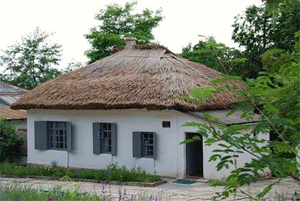
The little house in Pyatigorsk where Lermontov spent the two last months of his life

